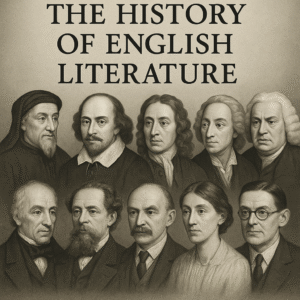1. Introduction to Marlon James as Prose WriterMarlon James as prose writer, has established himself as one of the most innovative voices in contemporary literature. His novels captivate readers from the very beginning with intricate plots, rich characterization, and immersive Read More …
Category: The History of English Literature

The History of English Literature offers a rich exploration of the development of literary works from the earliest Anglo-Saxon texts to contemporary masterpieces. This category provides in-depth articles, study guides, quizzes, and timelines covering key literary periods such as the Old English era, Middle English literature, the Renaissance, Neoclassical Age, Romantic Movement, Victorian literature, and Modernist innovations. Whether you are a student, researcher, or literature enthusiast, you’ll find detailed analyses of major writers like Geoffrey Chaucer, William Shakespeare, John Milton, Jane Austen, Charles Dickens, and T.S. Eliot. Discover how historical events, cultural movements, and philosophical ideas shaped the evolution of English literature over the centuries. Enhance your understanding of literary techniques, themes, and genres as you navigate through the fascinating journey of English literary history. This resource is ideal for exam preparation, academic research, and anyone passionate about the legacy of English literary traditions.
Teju Cole as Prose Writer – Post Postmodern Period
1. Introduction to Teju Cole as Prose WriterTeju Cole as prose writer has emerged. He is one of the most distinctive voices in contemporary literature. From the very start, his work captivates readers with reflective observations and intricate narrative style. Read More …
Jonathan Safran Foer as Novelist in the Post-Postmodern Period
1. Introduction to Jonathan Safran Foer Jonathan Safran Foer as novelist has earned a special place in post-postmodern literature. He blends innovation with emotional storytelling that resonates with modern readers. His fiction tackles trauma, memory, and identity while experimenting with Read More …
Ben Lerner as Novelist: A Post-Postmodern Voice
1. Introduction to Ben Lerner Ben Lerner as novelist demonstrates how fiction can merge intellect and emotion seamlessly. He is a post-postmodern writer who reshapes narrative boundaries through experimentation. His work reflects contemporary anxieties while offering intimate portraits of artistic Read More …
Jennifer Egan as Novelist
1. Early Life and Influences Jennifer Egan as novelist stands out for her daring experiments in form and style. Through her works, she redefines modern fiction while keeping readers deeply engaged. She grew up in Chicago, and later she moved Read More …
Colson Whitehead as Novelist: Life, Works, and Lasting Legacy
1. Early Life and Literary Foundations Colson Whitehead as novelist begins with strong foundations. He grew up in Manhattan surrounded by cultural diversity. Moreover, he absorbed influences from African American traditions and broader American narratives. His early years shaped thematic Read More …
Nick Hornby as Novelist – Post Postmodern Period
Early Life and Literary Beginnings Nick Hornby as novelist first emerged from his deep love of music, football, and culture. His upbringing in Surrey and later studies at Cambridge shaped his literary voice. He started his career writing essays and Read More …
David Mitchell as Novelist – Post Postmodern Period
Early Life and InspirationsDavid Mitchell as novelist is celebrated for his inventive structures and global themes. His works explore time, identity, and interconnected human experiences. He grew up in Worcestershire, and early experiences shaped his imagination deeply. His childhood interest Read More …
Zadie Smith as Novelist – Style and Legacy

Introduction Zadie Smith as Novelist powerfully captures the complexities of modern life clearly. Consequently, she utilizes a sophisticated Zadie Smith narrative style that blends humor with critique effectively. Furthermore, her work is central to Contemporary British fiction, focusing intensely on Read More …
Sarah Waters as Novelist
Introduction Sarah Waters as Novelist creates richly textured worlds for readers clearly. Consequently, she excels at blending historical accuracy with dark, compelling suspense effectively. Furthermore, her fiction consistently centers on themes of lesbian historical fiction and hidden desire constantly. Therefore, Read More …
